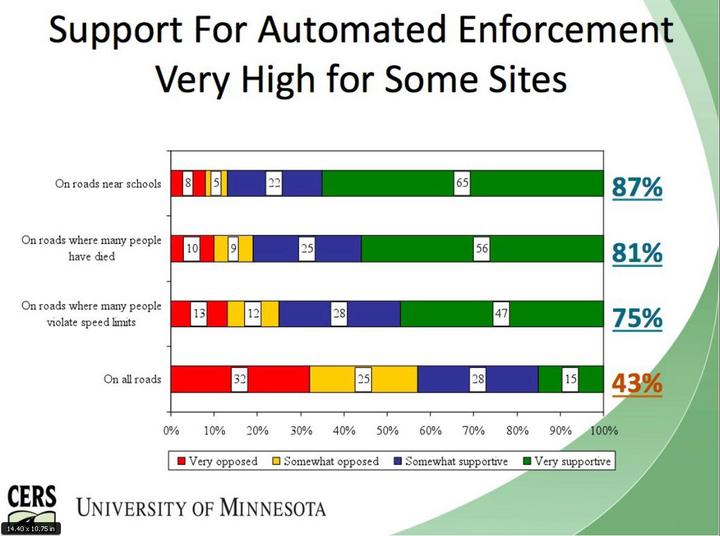Survey: Americans Support Automated Speed Enforcement
In Arizona, there has recently been heated debate about a law to monitor speeding with automated devices, such as stationary cameras and radars monitored from afar. Around the country, these "automated speed enforcement (ASE)" proposals are starting to get more serious consideration, because there is research indicating that such tools increase compliance with speed limit laws and decrease related crashes and fatalities. ASE is already in use in some parts of Arizona, California, Colorado, Illinois, Iowa, Maryland, New Mexico, North Carolina, Ohio, Oregon, Tennessee, and Washington, DC.
The University of Minnesota's Center for Excellence in Rural Safety (CERS) wanted to learn more about American drivers' attitudes on this issue. What we found was interesting.
At first glance, the public seems wary -- only 43% supported using these automated tools on "all roads." BUT, and this is a very significant "but," an overwhelming majority of American drivers supported using automated speed enforcement on some roads. For instance, an overwhelming 87% supported using it "on roads near schools," 83% supported using them "on roads where many people have died," and 75% supported using them "on roads where many people violate the speed limit."

So, how do you design an automated speed law that garners strong public support? Pick your spots carefully.
A number of aspects of ASE is appealing to Americans. One particularly attractive pro-ASE argument tested was "no one has to worry about tickets if they simply obey the law," with 69% finding that either "very convincing" (41%) or "somewhat convincing" (28%). Another argument that was particularly persuasive was "speeding kills thousands of innocent people, so current methods aren't effective enough and new approaches are needed." Seventy-two percent of Americans found that argument either "very convincing" (33%) or "somewhat convincing" (39%).
On the other hand, the opposition arguments that were most convincing to respondents were "it would cost too many tax dollars to buy, install and maintain all of the cameras," "the government would invade privacy with the information they could gather," and "drivers would find ways to evade the camera and radar systems and avoid the law." Those are the primary concerns supporters of automated speed enforcement need to address to gain public support.
The bottom line? Americans do have understandable questions about the cost, privacy and effectiveness of automated speed enforcement technology, but they are open to piloting the approach in some areas, because they do believe the approach could save lives.
In other words, the new CERS survey delivers the same message as the automated speed devices out on the streets - proceed, at a safe speed.
For more information go to:
CERS National Rural Road Safety Public Opinion Survey